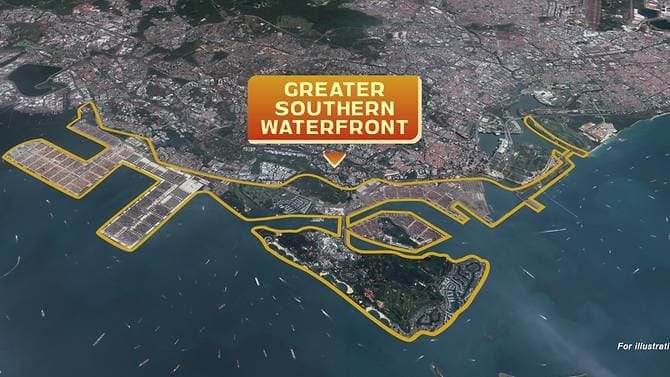SINGAPORE: Measures such as shorter leases and longer minimum occupancy periods (MOP) might help to mitigate the “lottery effect” of public housing at the Greater Southern Waterfront (GSW), experts said.
This follows the announcement by Prime Minister Lee Hsien Loong on Sunday that there are plans to build 9,000 private and public housing units on the site of the current Keppel Club when its lease expires in two years’ time.
The plot falls within the GSW which stretches 30km along the southern coastline.
The GSW is poised to become part of the Central Business District (CBD), incorporating residential, commercial and recreational quarters.
National Development Minister Lawrence Wong had in 2016 said that Government wants to preserve HDB living in the CBD, as it is mindful of the rich-poor divide.
But the Government would also look at ways to tighten resale conditions for such units, he said then.
This “lottery effect” came under the spotlight following the launch of Pinnacle@Duxton in 2004.
There was overwhelming response for the 1,848 units distributed across seven 50-storey blocks in Tanjong Pagar. Indicative prices for five-room units then, ranged from S$343,100 to S$451,500.
After the five year MOP in 2014, several five-room Pinnacle flats were sold for over S$1 million, with one sold for S$1.12 million in 2016, fetching what is possibly the highest resale price – at the time – for an HDB flat.
“The Government may have to introduce new policies that will deter speculative activities, such as the resale restrictions through longer MOPs, higher resale levies, and sale rights,” said Associate Professor Sing Tien Foo, director of the NUS Institute of Real Estate.
“One way is to sell the flat at a 60 or even 30-year lease rather than 99 years,” said Ms Christine Li, head of research at Cushman & Wakefield Singapore and Southeast Asia.
“When the leases are shorter, there is limited capital upside and will deter investors from purchasing these flats,” she added.
INCLUSIVENESS
Beyond getting the best use for prime land plots, experts said the Government would have other considerations when it decides to build public housing in locations such as the GSW.
“My view is that the Government would have considered other aspects and the other intangibles (such as vibrancy, inclusiveness of society and the local community) by having public housing in the area,” said Knight Frank’s head of research Lee Nai Jia.
“From an urban planning perspective, the Government has to consider the big picture such as overall economic growth and social objectives in deciding the uses,” he added.
“The main purpose of the exciting range of HDB flats is that the fruits of the prime Greater Southern Waterfront will be for everyone – not just for the super wealthy,” explained property analyst Ong Kah Seng.
“If it is purely private and residential and commercial use … it wouldn’t be ideal because it will edge out HDB dwellers or owners from having a chance to live in the Greater Southern Waterfront, an upmarket place.”
“One way is to have mixture of housing of different sizes, and also consider providing greater financial support or higher housing grants for lower income households,” Prof Sing said.
“To ensure that the Greater Southern Waterfront is for every Singaporean, the planning needs to ensure that all uses – private housing, public housing, commercial, mixed used etc. – are catered for and well integrated,” said Dr Yu Shi Ming, interim head of the NUS Department of Real Estate.
“Open up the area for the public – waterfront, water edge should remain accessible and not exclusively for gated communities,” he suggested.
Other ways to do it is to have common amenities for both private and public housing, suggested Prof Sing.
“The community bonding and activities could also be a way to reduce the stratification of residents,” he said.
He suggested integrating future HDB flats at the current Keppel Club site into the Telok Blangah neighbourhood. This would allow the Government to optimise land by expanding the existing amenities, he added.
Unlike the after-work quiet on weekdays and weekends in the CBD, “HDB flat dwellers are expected to be engaging in (more) neighbourhood and community activities than private home residents”, said Mr Ong.
“The Greater Southern Waterfront public housing can expect to inject more resident vibrancy and energise our future central localities.”
Source: CNA/cc
Read more at https://www.channelnewsasia.com/news/singapore/specific-measures-could-dampen-lottery-effect-of-public-housing-11825766




